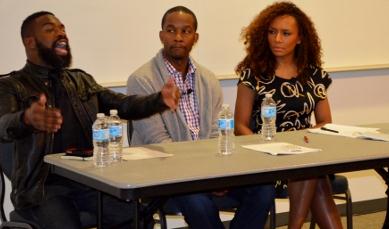Three prolific American queer activists spoke on a panel at Carleton University’s Pride week, Jan 25.
Former NFL player Wade Davis, trans writer Janet Mock and activist Darnell Moore candidly shared their personal stories and fielded questions from students and community members.
Moore took time after the panel to speak with Xtra about religion, feminism and the Queer Newark Oral History Project.
Listen to an edited recording of the panel below.
Xtra: You spoke of disconnect within today’s queer communities. Is this a new occurrence? Would you say the queer community has undergone a shift toward fragmentation in recent years?
Darnell Moore: I don’t think this is new. I think other movements have experienced the same [disconnect]. For example, the United States civil rights movement. One of the big things that came up amongst women within the civil rights movement was the lack of commitment to women’s space and the lack of commitment to ending sexism within the black nationalist framework that allowed women to be central to the movement. That’s one example. I think all movements have that issue. We’re always looking to de-centre and get rid of a centre. But what happens when you’re developing movements? You create new ones. There’s always going to be the question of who gets to be at the centre. When that happens other people get left out.
Can you explain to our readers what it means to be a male feminist?
For me it means, as a male, to make a commitment to interrogating the privileges that are attached to my gender expression. The privilege that shows up because I’m a masculine man, quote, unquote, whatever that means, and the privilege that shows up because I’m actually male. Statistics don’t lie. Who are mostly leading large companies? Men. Whose incomes are typically higher around the world? Men’s. Who tends to not be a victim of poverty around the world? Men. Because of our privilege in male-centric spaces, we are afforded with a lot of these benefits. My first job as someone who considers himself feminist is to interrogate myself. To think about what I’m doing in the world that might be keeping opportunities from women or even replicating sexism in their lives. Secondly, is to raise my voice and stand in solidarity with women against rape culture, against misogyny, against violence, standing in solidarity for reproductive rights to ensure that I’m on the front lines. But on the lines listening first to what my sisters and women are saying, as a man.
Do you think it’s possible to be queer and religious?
I do. I think we don’t do enough to celebrate queer religious people, or at least to allow that conversation to happen.
I got the impression from your talk that you threw off religion.
I consider myself a very spiritual person. I even consider myself a Christian. I still preach sometimes in churches. I pray, I believe in a spiritual being, a higher power. But the church as an institution — some churches, not all — there are also a lot of churches that are LGBT-friendly, queer-friendly that are doing wonderful work, and LGBT folk and allies can be safe in worship spaces. Not all are like that, so I want to . . . say to queer communities that we should be more open to having conversations about spirituality and religion within the spaces of the existing.
What was your motivation to found the Queer Newark Oral History Project?
I don’t want to take all the credit for founding it. It came from a conversation between myself and the co-coordinator, Beryl Satter, who is a professor at Rutgers University. We were at lunch and we were talking about the need to ensure the voices of LGBT people in Newark, New Jersey, were chronicled, in a society where we tend to think about queer history as only really being representative of certain people. To be very honest, a white queer history, a queer history that has never centred in urban spaces. We thought it was important to have a counter-narrative. We thought this would be an intervention, a way to say that there are other types of queer and trans people who exist around the world. They are not all privileged; some are actually living in urban spaces, some are homeless, some have disappeared because they have been murdered, some of them don’t look like us. That was our way of intervening and trying to make sure that the voices of the community that we are a part of could have their stories told and chronicled. We are still trying to do that work now, and it’s pretty phenomenal work.
Can you tell me about Newark Mayor Cory Booker? He is a very progressive mayor, which is unique in the US.
Cory Booker is very unique. A lot of the state’s firsts around LGBT issues happened under his watch. The first commission, it was an instrument of the government that was advising him on LGBT issues; the first LGBT after-school program in the state. He would raise the flag at Newark City Hall. He has produced the Newark policy board that just produced a white paper examining LGBT youth issues. This is an urban area that is mostly black and brown people. In America there tends to be this sort of thought that spaces like this aren’t as progressive. But here it is, a perfect example of a black and brown, poor and working-class space with a mayor like Cory Booker that has done phenomenal things in the state.
For more on the Queer Newark Oral History Project, visit the official site.


 Why you can trust Xtra
Why you can trust Xtra


